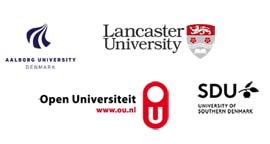

Social presence and impression management: Understanding networked learners’ cultivation of learning networks.
Benjamin Kehrwald, Charles Sturt University, Murat Oztok, Lancaster University
This theoretical paper focuses on the concept of impression management to explain how networked learners’ presentations of self as part of the establishment, cultivation and use of productive social learning networks. The arguments in this paper connect social presence, which has long been considered an important element of online learning, with social capital, which has been used more recently to describe the way learners use social networks to support their learning. These arguments are situated at the intersection of social connectivity, goal-directed learning activity and learner experience. The broad area of interest is how learners’ goals and intentions affect their activity and behaviour in networked learning environments. More specifically, we are concerned with how learners’ goals related to study and learning affect their intentional activity toward forming and using the social connections that constitute learning networks. In this context, impression management is used to describe and explain how learners intentionally construct presentations of self as part of cultivating their social presence in networked learning and how that presentation of self leads to the establishment and development of connections (or ties) with others and the development of a network of productive connections which support learning. We argue that the constructions of self are not arbitrary; rather, they are seen as intentional efforts by learners to present themselves in ways which are not only socially acceptable, but maximise the extent to which they are views as attractive partners for social learning activity. Learners read the social environment and act intentionally in response to the social context to present themselves in ways that further their goals of productive networked learning activity. By expressing themselves in particular ways and forming impressions of others, individuals are able to establish, cultivate and use social connections and then build social networks constituted of those connections. Those social networks provide learners with the connections they need to generate social capital, that is, to find and use the value (or resources) through connections or relationships that constitute a network. The paper concludes with a the identification of several questions for educators to consider as part of informing their practice of networked learning and supporting goal-directed, technology-mediated social processes and the cultivation of productive learning networks.
Keywords
social presence, social networks, social capital, impression management
Joint Organising Institutions
| Past Conference Proceedings |Call for Book Proposals| Contact |